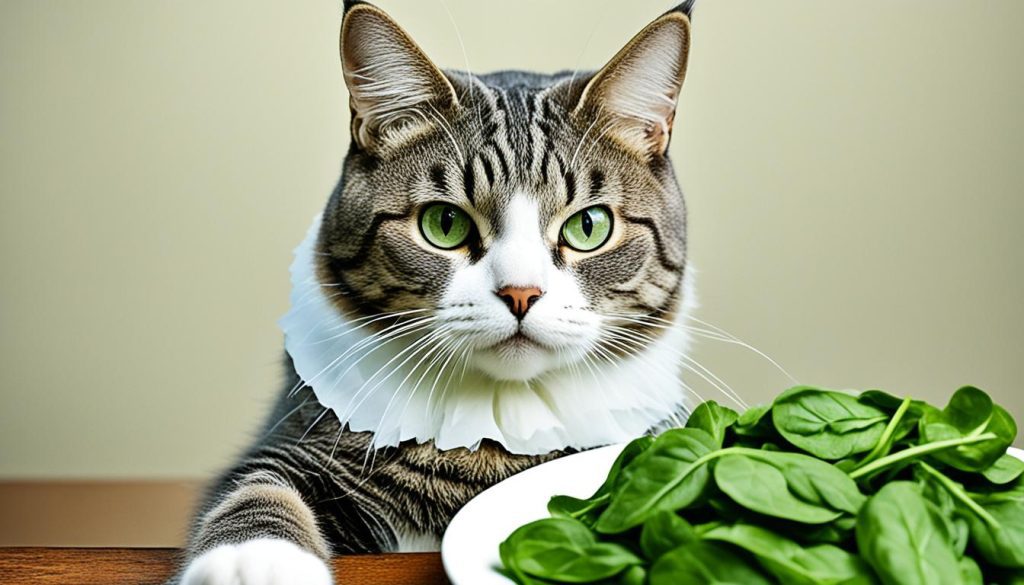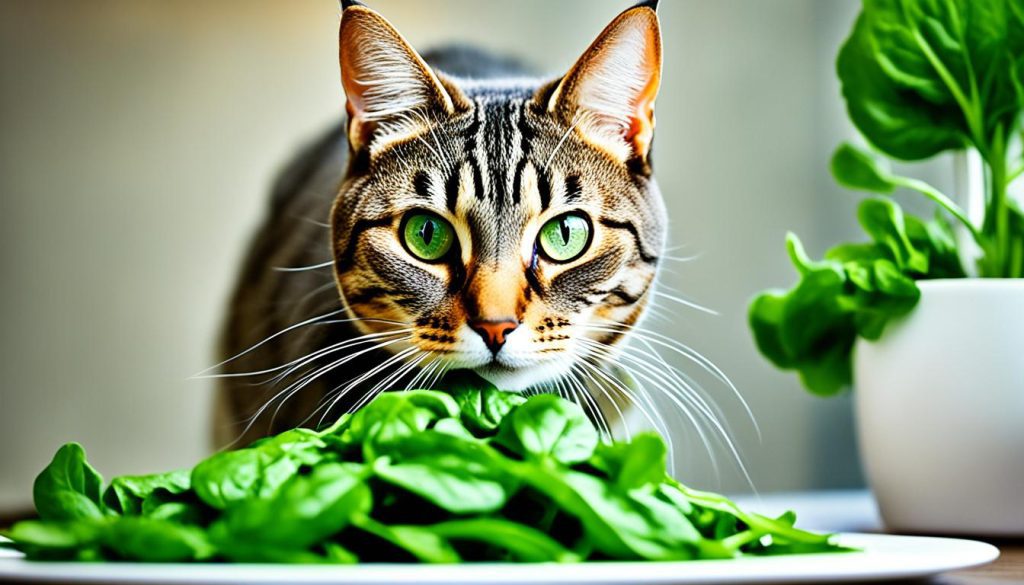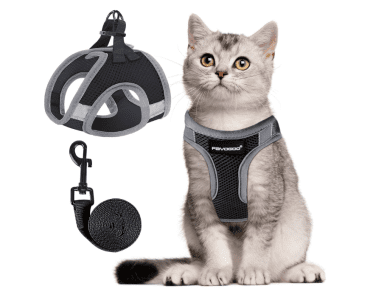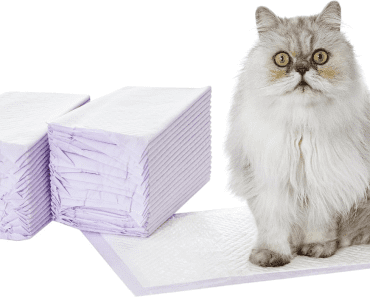As a cat owner and lover, I understand the importance of providing my feline friends with a balanced and nutritious diet. Naturally, questions may arise about what human foods are safe for cats to consume. One common inquiry revolves around spinach. Is this leafy green safe for our whiskered companions? Let’s explore the topic and uncover some valuable feline nutrition tips.
Can Cats Eat Spinach? Yes, but in moderation.
- Cats can eat spinach, but it is not necessary to incorporate it into their regular diet.
- Spinach can provide vitamins and minerals, but a high-quality cat food already contains all the necessary nutrients.
- Feeding cats small amounts of plain, cooked spinach as an occasional treat can be beneficial.
- Consult with a vet before introducing spinach to cats with kidney or urinary problems.
- Always feed spinach to cats in moderation and consider their overall health and dietary needs.
Can Cats Eat Spinach?
Yes, cats can eat spinach. Commercial cat food diets may even include spinach as an ingredient. However, it is not necessary to incorporate spinach into a cat’s regular diet as long as they are receiving a balanced cat food.
While cats are obligate carnivores and derive most of their nutrition from animal sources, a small amount of spinach can be beneficial. Spinach is rich in vitamins, minerals, and fiber, which can contribute to their overall well-being.
When offering spinach to cats as an occasional treat, it should be served in small portions. This leafy green vegetable can be steamed or gently sautéed without adding any salt, spices, or seasoning. Plain, cooked spinach is the best option for cats to avoid any potential digestive issues.
It is worth noting that some cats may not be interested in eating vegetables like spinach. Cats are obligate carnivores, meaning their bodies are designed to digest and derive nutrients from animal-based proteins. Therefore, it is more common for cats to prefer cat-specific treats or lean meat over vegetables or fruits.
While cats can eat spinach, it is not necessary for their diet. Spinach can be a safe and nutritious addition to their meals in small amounts and as an occasional treat. As with any dietary change, it is important to introduce new foods gradually and always consult with a veterinarian to ensure the well-being of your feline companion.
Is Spinach Good for Cats?
When it comes to feline nutrition, spinach can provide some vitamins and minerals that are beneficial for cats. However, it is important to note that cats do not require spinach in their diet. A high-quality cat food already contains all the necessary nutrients they need for overall well-being.
While spinach can be a healthy addition to a cat’s diet in small quantities, it is not essential. The primary source of nutrition for cats should be their regular cat food, which is specifically formulated to meet their dietary requirements.

Why consider adding spinach to a cat’s diet?
- Spinach is a good source of vitamins such as vitamin A, vitamin K, vitamin B6, and vitamin E. These vitamins contribute to a cat’s overall health and immune system.
- Spinach also contains minerals like magnesium, folate, calcium, and potassium, which are essential for various bodily functions.
- The fiber content in spinach can support a cat’s digestive system and help prevent constipation.
However, it is important to keep in mind that spinach should only be given to cats in small quantities as an occasional treat. Feeding too much spinach can disrupt the balance of their diet and potentially cause health issues.
It is always recommended to consult with a veterinarian before making any significant changes to a cat’s diet, including introducing spinach. The vet can assess the cat’s specific dietary needs and provide appropriate guidance.
How to Feed Spinach to Cats
When it comes to feeding spinach to cats, proper preparation is key to ensure it is safe and enjoyable for them. Follow these steps to incorporate spinach into your feline’s diet:
- Steam or gently sauté the spinach without adding any salt, spices, or seasoning. Excessive seasoning can be harmful to cats.
- Allow the cooked spinach to cool down before offering it to your cat. Heat can cause discomfort to your furry friend’s sensitive mouth.
- Offer a small portion of plain, cooked spinach to your cat and observe their reaction. Some cats may enjoy the taste and texture, while others may not be interested.
It’s essential to note that cats are obligate carnivores, and their nutritional requirements are primarily fulfilled through animal proteins. While spinach can be a healthy addition to their diet in small amounts, it shouldn’t replace their regular cat food. Cats generally prefer cat-specific treats or lean meat over vegetables or fruits.
Remember to follow the rule of 10% when giving treats to cats. Treats should not constitute more than 10% of their daily calorie intake to maintain a balanced diet and prevent obesity or nutritional imbalances.
Is Spinach Safe for Cats with Health Issues?
While spinach is generally safe for cats, it may not be suitable for cats with kidney or urinary problems. Spinach contains calcium oxalate, which can lead to the formation of harmful crystals in the urinary tract. It is crucial to consult with a vet before feeding spinach to cats with any health issues to ensure it will not exacerbate their condition.

Considerations for Cats with Health Issues
- Cats with kidney or urinary problems should avoid spinach due to its high calcium oxalate content.
- Calcium oxalate can contribute to the formation of crystals in the urinary tract.
- Consult with a vet to determine the appropriateness of feeding spinach to cats with specific health conditions.
Always prioritize your cat’s health and well-being when introducing new foods into their diet. While spinach can be a nutritious addition to a cat’s diet, it is crucial to consider any preexisting health issues and consult with a vet before incorporating it into their meals.
Spinach Benefits and Risks for Cats
Spinach can be a valuable addition to a cat’s diet, providing them with essential vitamins, minerals, and fiber. In small quantities, spinach offers nutritional benefits that support feline health and well-being.
First and foremost, spinach is rich in vitamins such as vitamin A, which promotes healthy vision, and vitamin K, which aids in blood clotting. It also contains vitamins B6, B2, and E, which play crucial roles in feline nutrition.
In addition to vitamins, spinach is a good source of minerals like magnesium, folate, calcium, and potassium. These minerals contribute to various bodily functions, including bone health, enzyme activity, and muscle function.
However, it’s essential to be aware of the potential risks associated with feeding spinach to cats, particularly those with urinary problems. Spinach contains calcium oxalate, which can contribute to the formation of crystals in the urinary tract, leading to discomfort and potential health issues.
Therefore, if your cat has a history of urinary problems or is prone to such issues, it is best to consult with a veterinarian before introducing spinach into their diet. The vet can provide guidance on whether spinach is safe for your cat and in what quantities.
Overall, spinach can offer nutritional benefits to cats when fed in moderation. It is important to remember that spinach should not replace a cat’s main cat food, but rather be given as an occasional treat. Proper portion control, as well as monitoring your cat’s health and any underlying conditions they may have, is key to ensuring the safe inclusion of spinach in their diet.
Conclusion
After considering the question “Can cats eat spinach?” and exploring the benefits and risks, it is clear that while cats can eat spinach, it is not necessary for their diet. A balanced and high-quality cat food already provides all the necessary nutrients for their overall health and well-being.
While spinach can offer vitamins and minerals, it should only be given to cats in moderation and as an occasional treat. Feeding spinach in small quantities can be a nutritious addition to their diet, but it should never replace their main cat food.
It is important to remember that not all cats will enjoy spinach, as they are obligate carnivores and tend to prefer treats that are specifically formulated for their dietary needs. Furthermore, if your cat has any health issues, especially related to the kidneys or urinary tract, it is essential to consult with a vet before introducing spinach or any new food into their diet.
While spinach is safe for cats, it is best to offer it in small quantities and always consider a cat’s individual needs and health condition. As with any changes in a cat’s diet, consulting with a vet is crucial to ensure their safety and well-being.






